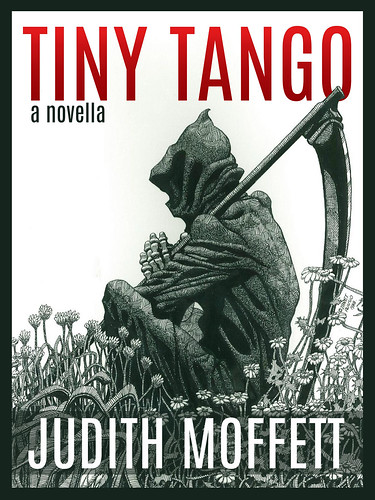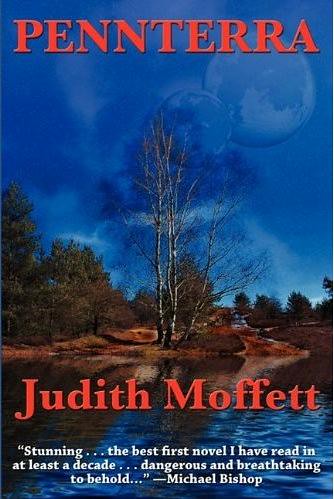 I know, I know... Where have I been these past nearly two months? (Sometimes a guy just needs to veg for a while....) Anyhow, here I am! But let me also add a teaser: I've been busy reading a new manuscript from Charles Stross for the next volume in his Laundry Files series!
I know, I know... Where have I been these past nearly two months? (Sometimes a guy just needs to veg for a while....) Anyhow, here I am! But let me also add a teaser: I've been busy reading a new manuscript from Charles Stross for the next volume in his Laundry Files series!
In this post, the book that I want to introduce you to is by Judith Moffett. Now if you've read this blog regularly over these past years you will recognize her name, as I have written about her on numerous occasions. In fact, if you scroll down just a bit, in the sidebar on the right you will see the cover for her Hugo and Nebula award-nominated story "Tiny Tango," along with a link to the four-part series on how we turned this story into an ebook. And one of my earliest blog posts on Ms. Moffett's work was back in February 2010 entitled "Aliens Have Entered Mainstream's Orbit." Feel free to search this blog (see Search field on the right) for "Judith Moffett" for a list of all the entries.
In 1988, Moffett won the John W. Campbell Award for Best New Writer in the field of science fiction and fantasy. But what you may not know is that, long before writing sf, Moffett was (and still is!) a poet -- and a helluva poet at that. Here are just a few of her awards and honors: (1971) First prize, Graduate Division, in the Academy of American Poets Contest at the University of Pennsylvania; (1976) First Ingram Merrill Foundation Grant in poetry; (1984) National Endowment for the Arts Creative Writing Fellowship Grant; and, even after launching a successful science fiction writing career: (1998) Presenter at the Nobel Symposium on Translation of Poetry and Poetic Prose. But enough of the kudos...you can read the complete list of "Awards, honors, and recognitions" in her Wikipedia entry.
 |
| Merrill & Moffett, 1993, International Poetry Festival, Malmö, Sweden |
I bring up poetry because that is the focus of her most recent publication, Unlikely Friends, a memoir of her near thirty-year friendship and correspondence with Pulitzer Prize-winning poet James Merrill. I had the honor of line editing and copy editing the manuscript: more than 200,000 words of diligently maintained journal entries from throughout that friendship, carefully transcribed correspondence, photographs -- and above all, the personal insight gleaned by the author upon looking back upon those decades.
For those readers in the book/publishing biz, you most likely know that a Kirkus review is difficult to come by: the publication is fairly stingy with its reviews. That being said, imagine how difficult it is to not only get reviewed by Kirkus, but to snag a starred review as well. And that's exactly what Unlikely Friends did: it garnered a starred review -- and, to top it all off, the memoir is self-published! Here's an excerpt from that review:
For those readers in the book/publishing biz, you most likely know that a Kirkus review is difficult to come by: the publication is fairly stingy with its reviews. That being said, imagine how difficult it is to not only get reviewed by Kirkus, but to snag a starred review as well. And that's exactly what Unlikely Friends did: it garnered a starred review -- and, to top it all off, the memoir is self-published! Here's an excerpt from that review:
"Her Merrill scholarship is exhaustive, as she spent years writing a book about his work while finding success with her own poetry. She and Merrill were rarely in the same place, but she lovingly describes a 1973 trip to Greece and moments at his New York City apartment. Both eventually struggled with serious health problems, but they remained close due to their obvious reliance on each other's intellect and their lifelong dedication to their crafts. Moffett's painstaking memoir is epic in length but remains consistently engrossing. Particularly noteworthy is her desire to get to the root of her own fascination with Merrill, and she reaches some surprising conclusions about herself. She tells her own life story of struggle and success with undying fervor, and Merrill's letters show him to be urbane, witty, a bit fussy, and generous when it mattered. The two were different in many ways, but Moffett's account of what they shared is authentic and impressive.
An absorbing, indispensable portrait of poets."
–Kirkus starred review, January 23, 2019
If you have access to Facebook, Moffett has been publishing lengthy excerpts and photographs from the book on her FB page.
And as I was writing this, I remembered that in 2016 I had noted in a blog post the receipt of her most recent poetry book (at that time), Tarzan in Kentucky: about life on her farm, grief (the loss of her husband), and other poems of a more personal nature.
Both Unlikely Friends (print and ebook) and Tarzan in Kentucky
(print and ebook) and Tarzan in Kentucky (print only) are available from your bookstore of choice; the links here will take you to Amazon.com.
(print only) are available from your bookstore of choice; the links here will take you to Amazon.com.
"By culling a trove of letters and journals, Moffett has written an account of her friendship with Merrill that somewhat suggests the vivid quality of a novel. In every chapter the events of particular years are given the importance they had when they happened—they are not simply bridges to some later, more important time, but events in their own immediacy. The dense braid of writing by the various Judys of those years, and the Judy now reflecting and summing up, gives her narrative the four-dimensional effect of deep time. It's a love story—love of literature, of friends, of idealized figures who were also real people. It will send you back to Merrill's poems, and Moffett's too."
–Kim Stanley Robinson, author of The Mars Trilogy andNew York 2140














![[Post to Twitter]](http://www.judithmoffett.com/tweet-this-small.png)